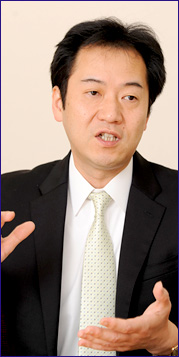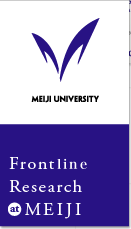

Measures That Can be Taken to Revitalize Small and Medium-Sized Enterprises
My specialty—small and medium-sized enterprises studies—is a rarity worldwide as a university-level lecture subject. The history and accumulation of imported knowledge related to small and medium-sized enterprises research in Japan is said by some to be top in the world. Furthermore, Meiji University was one of the first to establish this academic subject (small and medium-sized enterprises administration studies), making the University a pioneer in the field.Many research examples in business administration studies focus on large enterprises, but more than 99% of the approximately 4.2 million companies in Japan are small and medium-sized enterprises. Therefore, there can be no discussion about the economy of Japan without knowledge of such businesses. During the current era of economic downturn, the companies we must revitalize first are these small and medium-sized enterprises. We must find out where growing companies are different from others, and what is demanded of corporate managers in this day and age. I visit as many as 100 different companies each year as part of research based on the theme of growth strategy—in other words, research into ways to further invigorate small and medium-sized enterprises. I then organize the results of my research and make efforts to convey them to a large number of other management executives.
The Path to Becoming a Researcher Based on the Idea of “Advancing Further”
I continued on from the Meiji University School of Business Administration to the Graduate School and began studying small and medium-sized enterprises administration under Professor Mutsumi Watanabe, a leading expert in the field. Professor Watanabe gave me one book to work with as soon as I entered the program, and at the time I found it to be incredibly challenging and difficult to understand. The professor said to me, “It’s hard to understand, right? Well then, let’s go see how things work in a real company.” This was an instance that made a distinct impression on me and stands out in my mind to this day. I had initially continued on to graduate school to study a bit more before taking my place in society, but at the moment Professor Watanabe said that to me, I came to understand the difference between undergraduate-level and graduate-level studies. From that time forward, the more I learned the more I was compelled to advance even further. I have retained this mindset until the present day.I mentioned company visits above—this means visits to actual small and medium-size enterprises. It is often said that one must know the actual situations at companies themselves in order to pursue studies in this field. During my time as a graduate student, I was able to understand the depth and breadth of this academic field through visits to numerous small and medium-sized enterprises where I talked with management and regular staff. I was also able to expand my thinking through discussions with students in other research groups. These experiences aid me greatly today as a researcher.
Numerous People with Active Experience in Society for a Rich Array of Networking and Advancement Opportunities!
Within business administration studies, both a Research Course and a Management Course are available, and a large number of people are interested becoming students in the Research Course—these include people striving to becoming researchers, members of the so-called “samurai” fields including certified public accountants and licensed tax accountants, public employees, and people aiming for employment in private-sector companies. Over the course of their graduate studies, I hope these students will learn of the vast diversity among existing companies, as well as the gaps and differences between university studies and actual society, while expanding their scope of thinking and developing further as human beings.The Management Course is taken mainly by those who are already active in society, such as “samurai” field professionals and management executives. I want to provide such students with opportunities to theorize and provide solutions to questions that almost anybody working in the field would have, which is where the true pleasure of this course’s studies can be felt. The Graduate School is not only a place where students obtain specialized knowledge, but it is also a venue for cultivating various types of know-how, personal connections, and more. I want each student to have their own goals and utilize capabilities gained through academic study at this school to help achieve their dreams.
Profile
Professor, Graduate School of Business Administration, Meiji UniversityBorn in Niigata Prefecture. Specializes in small and medium-sized enterprises studies. His research focuses on problems in and empirical studies on Japanese small and medium-sized enterprises. He withdrew after completing coursework in 1991 at the Meiji University Graduate School, and began serving in his current position in 2001. Major published works include “Igirisu no Chusho Kigyo Seisaku” (“British Policies for Small and Medium-Sized Enterprises,” ed. Hisakazu Fukushima), which was included in Chusho Kigyo Seisaku no Kokusai Hikaku (“International Comparisons of Policies for Small and Medium-Sized Enterprises,” collaborative work published Shinhyoron).









